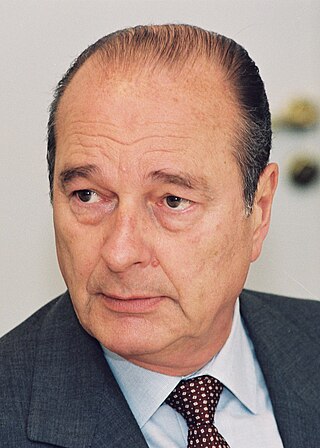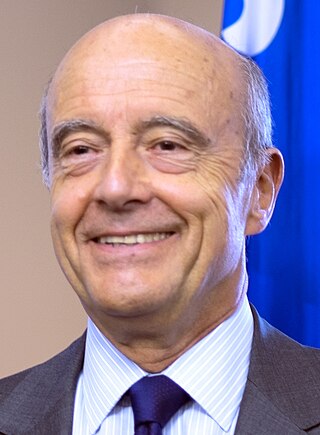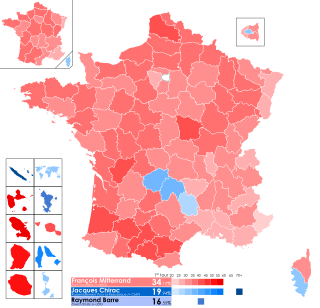
Jacques René Chirac was a French politician who served as President of France from 1995 to 2007. He was previously Prime Minister of France from 1974 to 1976 and 1986 to 1988, as well as Mayor of Paris from 1977 to 1995.

Lionel Robert Jospin is a French politician who served as Prime Minister of France from 1997 to 2002.

Michel Rocard was a French politician and a member of the Socialist Party (PS). He served as Prime Minister under François Mitterrand from 1988 to 1991 during which he created the Revenu minimum d'insertion (RMI), a social minimum welfare program for indigents, and achieved the Matignon Accords regarding the status of New Caledonia. He was a member of the European Parliament, and was strongly involved in European policies until 2009. In 2007, he joined a Commission under the authority of Nicolas Sarkozy's Minister of Education, Xavier Darcos.

Gaullism is a French political stance based on the thought and action of World War II French Resistance leader Charles de Gaulle, who would become the founding President of the Fifth French Republic. De Gaulle withdrew French forces from the NATO Command Structure, forced the removal of Allied bases from France, as well as initiated France's own independent nuclear deterrent programme. His actions were predicated on the view that France would not be subordinate to other nations.

The Rally for the Republic was a Gaullist and conservative political party in France. Originating from the Union of Democrats for the Republic (UDR), it was founded by Jacques Chirac in 1976 and presented itself as the heir of Gaullist politics. On 21 September 2002, the RPR was merged into the Union for the Presidential Majority, later renamed the Union for a Popular Movement (UMP).

The Union for French Democracy was a centre-right political party in France. The UDF was founded in 1978 as an electoral alliance to support President Valéry Giscard d'Estaing in order to counterbalance the Gaullist preponderance over the political right in France. This name was chosen due to the title of Giscard d'Estaing's 1976 book, Démocratie française.

Alain Marie Juppé is a French politician. A member of The Republicans, he was Prime Minister of France from 1995 to 1997 under President Jacques Chirac, during which period he faced major strikes that paralysed the country and became very unpopular. He left office after the victory of the left in the snap 1997 legislative elections. He had previously served as Minister of Foreign Affairs from 1993 to 1995, and as Minister of the Budget and Spokesman for the Government from 1986 to 1988. He was president of the political party Union for a Popular Movement (UMP) from 2002 to 2004 and mayor of Bordeaux from 1995 to 2004.

Édouard Balladur is a French politician who served as Prime Minister of France under François Mitterrand from 29 March 1993 to 17 May 1995. He unsuccessfully ran for president in the 1995 French presidential election, coming in third place.

Presidential elections were held in France on 23 April, with a second round on 7 May.
Cohabitation is a system of divided government that occurs in semi-presidential systems, such as France, whenever the president is from a different political party than the majority of the members of parliament. It occurs because such a system forces the president to name a premier who will be acceptable to the majority party within parliament. Thus, cohabitation occurs because of the duality of the executive: an independently elected president and a prime minister who must be acceptable both to the president and to the legislature.

Pierre Eugène Bérégovoy was a French politician who served as Prime Minister of France under President François Mitterrand from 2 April 1992 to 29 March 1993. He was a member of the Socialist Party and Member of Parliament for Nièvre's 1st constituency.

Presidential elections were held in France on 24 April and 8 May 1988.

Legislative elections were held in France on 25 May and 1 June 1997 to elect the 11th National Assembly of the French Fifth Republic. It was the consequence of President Jacques Chirac's decision to call the legislative election one year before the deadline.

Legislative elections were held in France on 5 and 12 June 1988, to elect the ninth National Assembly of the Fifth Republic, one month after the re-election of François Mitterrand as President of France.

Legislative elections were held in France on 16 March 1986 to elect the eighth National Assembly of the Fifth Republic. Contrary to other legislative elections of the Fifth Republic, the electoral system used was that of party-list proportional representation.

Legislative elections were held in France on 14 and 21 June 1981, to elect the seventh National Assembly of the Fifth Republic.
The Gauche Plurielle was a left-wing coalition in France, composed of the Socialist Party, the French Communist Party, the Greens, the Left Radical Party, and the Citizens' Movement. Succeeding Alain Juppé's conservative government, the Plural Left governed France from 1997 to 2002. It was another case of cohabitation between rival parties at the head of the state and of the government. Following the failure of the left in the 2002 legislative election, it was replaced by another conservative government, this time headed by Jean-Pierre Raffarin.
The Rennes Congress was the thirteenth national congress of the French Socialist Party. It took place from 15 to 18 March 1990.

The Centre of Social Democrats was a Christian-democratic and centrist political party in France. It existed from 1976 to 1995 and was based directly and indirectly on the tradition of the Popular Republican Movement (MRP). The CDS was one of the co-founding parties of the European People's Party, and later merged into the Democratic Force.

The Socialist Party is a French centre-left and social-democratic political party. It holds pro-European views. The PS was for decades the largest party of the "French Left" and used to be one of the two major political parties in the French Fifth Republic, along with The Republicans. It replaced the earlier French Section of the Workers' International in 1969 and is currently led by First Secretary Olivier Faure. The PS is a member of the Party of European Socialists, Progressive Alliance and Socialist International.


















